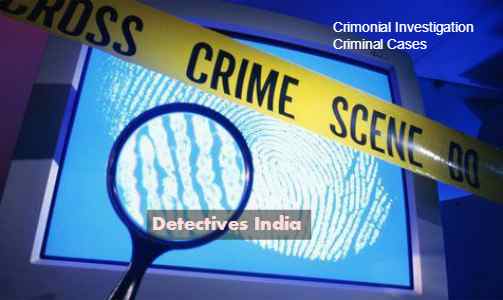Detectives India – Criminal investigation procedure

Page of Contents
Detectives India -Areas of intervention in criminal investigation
Search for testimonials, hearing witnesses in criminal investigation
Detectives India– Because there may be shortcomings of the judicial system and because recent cases have brought to light harmful errors and heavy consequences, the Detectives of India are brought to bring their skills to people who have no other way appeal.
The counter-criminal investigation is a generic term that must be understood in a very restrictive sense, the law providing that only the judicial authorities have in criminal investigation matters the prerogatives of investigations.
Our quality allows, in the absolute and strict framework of the law, to take back, to verify the elements of a criminal cases file and possibly to collect new evidence or testimonies useful to the manifestation of the truth, but also to give a new impulse to classified procedures.
More generally, private investigators will support civil, commercial and criminal litigation investigation.
In collaboration with the lawyers and relatives, the Detectives of India will study the requests and propose a strategy of research and adapted verification.
The Detectives of India can also help to assert the right of every citizen to the manifestation of the truth, and this even if the facts denounced by him, did not give rise to an investigation.
Similarly, when all research or official criminal investigation is abandoned, a private investigator can participate and deploy in agreement with the applicant, actions and investigations, which can solve classified cases.
Recent news, both national and international, highlights the interest of private law investigators in the outcome of these cases.
An alternative to the complaint of criminal cases investigation
It is the possibility for the natural or legal person 1 , the victim of the offense, to obtain enough element to dissuade the perpetrator from starting again and thus to be able to start negotiations allowing the compensation of the damage without having to trigger the public action 2 .
It should be noted that in criminal investigation law the withdrawal of a complaint is, in principle, without effect on the exercise of the public action (with the exception of Article 6 paragraph 3 of the Code of Criminal cases Procedure).
It is therefore a means of obtaining compensation for the injury more quickly through negotiations, but also a means of not prosecuting the offender.
The case then remains in a strictly private context subject to professional secrecy and the victim can then take note of the various elements found by Detectives India (by a regular follow-up of the results of the criminal investigation and the delivery of a detailed report). which is not the case during a legal proceeding since the instruction 4 is kept secret within the limits fixed by the law.
Experience shows us that there are different reasons for choosing this mode of investigation. It could be : Family interests when it is a family member who is the perpetrator of the offense Commercial interests to preserve the image of a company.
Financial interests when the author is not solvent, to find another way to obtain compensation for the damage by allowing the person responsible to avoid imprisonment)
Contractual interests in order to allow the employee to negotiate his / her dismissal and to avoid a conviction, such as theft in a company for example.
Special interests to know and understand the reasons that led the author to commit the offense)
Whatever the reasons, Detectives India plays a vital role in the investigation allowing you to obtain elements of response.
The different actions possible in certain specific cases of the procedure
Even if the offense is established and legally punishable, the prosecutor may decide not to prosecute it. It is article 40-1 of the Code of Criminal Procedure which provides for it “The public prosecutor receives complaints and denunciations and appreciates the follow-up to be given to them”.
The reasons that push the prosecutor not to pursue are:
The facts brought to his attention can not be qualified; there is no offense or the offense is not sufficiently characterized.
The offender has remained unknown (case of proceedings against X, the complainant is not interested in the case, the behavior, the prejudice or the disorder is minimal.
In this case, the prosecutor issues a dismissal that ends the procedure and therefore the investigation conducted by the police.
This administrative measure is not definitive and the prosecutor can come back at any time on his decision and prosecute if new elements are brought to the case insofar as there is no extinction of the public action ( prescription, amnesty, repeal of the criminal law, death).
In this case, you have two possible means of action.
Direct summons for contraventions and misdemeanors that do not require a training phase
The complaint with civil party for the crimes requiring a phase instruction and the crimes
Direct citation is a straightforward procedure that allows the victim to go directly to the court by informing the accused of the location and date of the hearing.
It is then possible to make an offense quickly by the criminal court to the extent that there is no doubt about the person who committed the offense causing the damage. Detectives India, professional in the administration of the proof, can then play a key role in this procedure by helping you to report the sufficient elements to allow you to identify the author and to prove his guilt.
A quick way to get compensation for his injury.
The complaint with civil party action is possible when 3 months after the filing of a complaint, the prosecutor decides the classification or there is no prosecution. The case is then brought before the investigating court. Generally speaking, it is up to the public prosecutor, using the powers of the state power at his disposal, to establish the guilt of the respondent.
But in this case, it is often the victim accompanied by his lawyer to prove the guilt of the defendant because we must not forget that the prosecution was launched against the will of the Public Ministry.
Detectives India can then advise you its best lawyers and work in close collaboration with them in order to give you all the chances of winning your case during your trial.
The reopening of a judicial inquiry
It is Article 188 of the Code of Criminal Procedure which specifies that when the investigating judge has pronounced a non- suit 4 , the indictment or the person named in a complaint with civil party can no longer be ” looking ” at the same fact, unless it happens to new charges.
Detectives India may then intervene by attempting to adduce other evidence allowing the reopening of the information in the event of the occurrence of new charges or in the case where the person has not been designated (complaint against X) of allow the opening of new information, for the same facts, against a person this time called.
The counter criminal investigation
No one is immune from an error of fact of the judges, despite the double degree of jurisdiction and the appeal in cassation. A principle in criminal law is that a judgment rendered by a judge once the appeals have been exhausted (appeal and appeal in cassation) has authority of force judged, in other words that it is not possible to reverse the decision rendered.
There are then two cases.
The company has left at liberty, not convicted a guilty person
Society has unfairly sentenced an innocent.
In the first case, the law does not allow in principle to be able to reconsider the decision rendered. In this case, the offender is left at liberty in order to ensure legal certainty of the principle of res judicata; the value of the decision outweighs any consideration, including the rage or bitterness of letting a culprit loose.
However, in the second case, when an innocent person has been unfairly condemned, the principle disappears in the face of the absolute necessity of declaring the truth.
In this case it is then possible to intervene, it is the Code of Criminal Procedure in its articles 622 to 626 which organizes a procedure of revision of the irrevocable decisions tainted of an error of fact and repair of the damage suffered from the made an unjustified conviction.
Persons with locus standi are appointed by Article 623 of the Code of Criminal Procedure and there is no time limit to act.
Detectives India then offers you with its legal knowledge, experience and professionalism the opportunity to do everything possible to repair an error that may have committed justice.
In criminal matters, the action of Detectives India is limited to cases previously seen. Only police services are authorized to carry out official investigations, otherwise the quality of the investigation may be compromised.
1 Company
2 Legal action taken against those who have committed an offense with a view to applying a sentence provided for by a law .
3 Phase of the criminal procedure during which are implemented by the investigating judge means to bring together all the elements necessary for the manifestation of the truth so that the court or court can make an informed judgment .
4 The investigating judge puts an end to the criminal proceedings because he felt that the offense was not established or that there was insufficient evidence for the defendant to be the perpetrator or accomplice of the offense.






